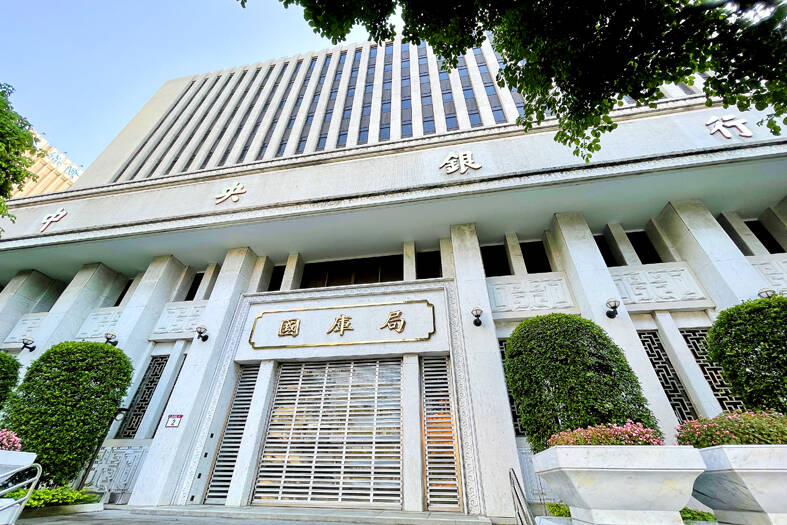The central bank yesterday asked domestic lenders to come up with self-disciplinary measures by Sept. 6 to limit mortgage operations to prevent an overconcentration of real-estate loans.
The monetary policymaker made the request after meetings with 34 local lenders and cooperative banks to gain a better understanding of the housing market, said Alan Pan (潘榮耀), director general of the central bank’s banking department.
The central bank called on all lenders to submit quantitative control measures on their own to cool mortgage operations as “all agreed the housing market is heating up,” Pan told an online news conference yesterday.

Photo: George Tsorng, Taipei Times
As of June 30, real-estate lending accounted for 37.4 percent of the banking system’s loans, close to the record of 37.9 percent, Pan said.
He called for greater diversification and suggested that it would be safer to keep the ratio at 35 percent to 36 percent to avoid credit crunches for other business sectors.
House loans and prices showed signs of moderation between June 2020 and June last year following waves of selective credit controls and unfavorable policy measures, the central bank said.
However, housing fever surged again in the second half of last year following the government’s introduction of favorable lending terms for first-home buyers, including interest subsidies, a five-year grace period and mortgages of 40 years, the central bank said.
An overconcentration of credit in real estate threatens the stability of the financial system and would hinder the growth of other sectors, it said.
All banks should exercise caution and move to prevent money from overflowing to the property market to help to curb speculation and land hoarding, practices that would spur unreasonable price hikes, Pan said.
Banks should apply their own quantitative control measures without affecting loans intended for urban renewal projects, first-home purchases and relocations, he said.
The central bank would launch inspections to make sure lenders follow through with their own control measures, he added.
Further, the central bank would continue to monitor the housing market and introduce more credit controls, if necessary, to maintain the health of the financial system. The bank is due to review its monetary policy on Sept. 19.
In a related development, the Ministry of Finance yesterday said that a second wave of inspections found 73 more cases of fraudulent buyers and misuses of the favorable lending terms.
The inspections led to a crackdown on 39 fraudulent buyers and 34 mortgagers who leased out their apartments, the ministry said.

Nvidia Corp chief executive officer Jensen Huang (黃仁勳) on Monday introduced the company’s latest supercomputer platform, featuring six new chips made by Taiwan Semiconductor Manufacturing Co (TSMC, 台積電), saying that it is now “in full production.” “If Vera Rubin is going to be in time for this year, it must be in production by now, and so, today I can tell you that Vera Rubin is in full production,” Huang said during his keynote speech at CES in Las Vegas. The rollout of six concurrent chips for Vera Rubin — the company’s next-generation artificial intelligence (AI) computing platform — marks a strategic

REVENUE PERFORMANCE: Cloud and network products, and electronic components saw strong increases, while smart consumer electronics and computing products fell Hon Hai Precision Industry Co (鴻海精密) yesterday posted 26.51 percent quarterly growth in revenue for last quarter to NT$2.6 trillion (US$82.44 billion), the strongest on record for the period and above expectations, but the company forecast a slight revenue dip this quarter due to seasonal factors. On an annual basis, revenue last quarter grew 22.07 percent, the company said. Analysts on average estimated about NT$2.4 trillion increase. Hon Hai, which assembles servers for Nvidia Corp and iPhones for Apple Inc, is expanding its capacity in the US, adding artificial intelligence (AI) server production in Wisconsin and Texas, where it operates established campuses. This

US President Donald Trump on Friday blocked US photonics firm HieFo Corp’s US$3 million acquisition of assets in New Jersey-based aerospace and defense specialist Emcore Corp, citing national security and China-related concerns. In an order released by the White House, Trump said HieFo was “controlled by a citizen of the People’s Republic of China” and that its 2024 acquisition of Emcore’s businesses led the US president to believe that it might “take action that threatens to impair the national security of the United States.” The order did not name the person or detail Trump’s concerns. “The Transaction is hereby prohibited,”

Garment maker Makalot Industrial Co (聚陽) yesterday reported lower-than-expected fourth-quarter revenue of NT$7.93 billion (US$251.44 million), down 9.48 percent from NT$8.76 billion a year earlier. On a quarterly basis, revenue fell 10.83 percent from NT$8.89 billion, company data showed. The figure was also lower than market expectations of NT$8.05 billion, according to data compiled by Yuanta Securities Investment and Consulting Co (元大投顧), which had projected NT$8.22 billion. Makalot’s revenue this quarter would likely increase by a mid-teens percentage as the industry is entering its high season, Yuanta said. Overall, Makalot’s revenue last year totaled NT$34.43 billion, down 3.08 percent from its record NT$35.52